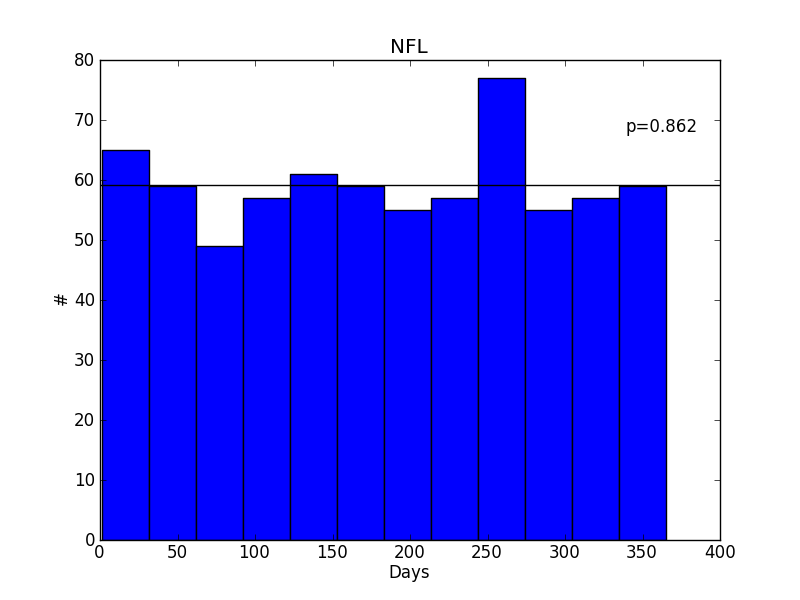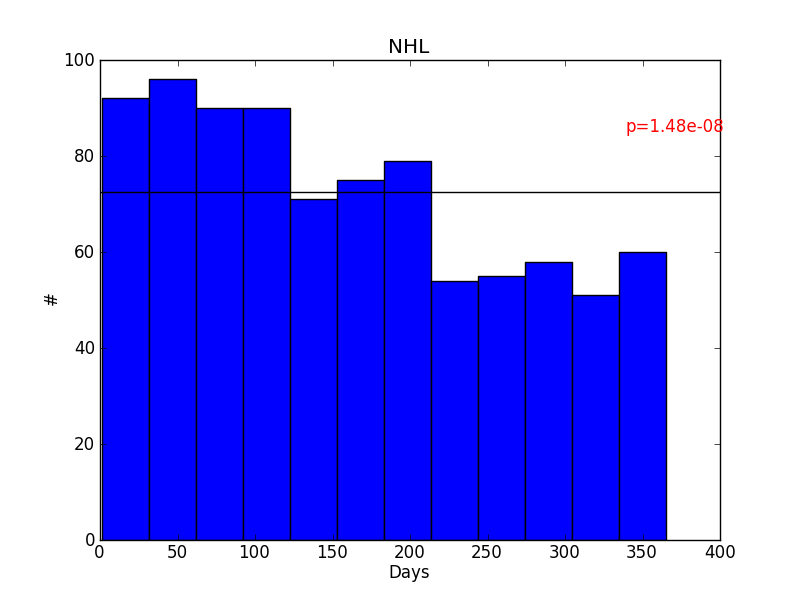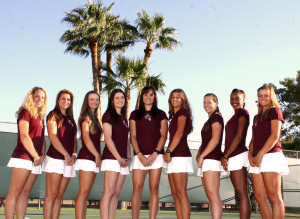When Astrology Works: Birthday Effects in Sports
30 Jul 2013Anybody else remember Danny Almonte? He was the star Little League pitcher who led a team from the Bronx to a third place finish in the Little League World Series in 2001. Then it was revealed that Danny was actually two years older than his birth certificate said, making him too old for the league. The lesson here is that you can look like a damn good athlete if you are playing against littler kids.
I'd heard about the ice hockey relative age effect in the horrible Malcolm Gladwell book Outliers, and again in the slightly less horrible Freakenomics by Dunbar and Levitt.
If one looks at the distribution of birth dates in the general population, it's pretty random. There's about the same number of people born on every day of the year. That's not true when you look at professional hockey players, they are more likely to have birthdays early in the year.
The most common explanation for this is that it's a case of "the rich get richer"**. If we take a bunch of 6 year-old kids and put them in a hockey league, some will do well and others will suck. Coaches will spend more time with the talented kids, encouraging them to continue in the sport, putting them on all-star teams, etc. But out of those 6 year-olds, some will have just turned 6, while others are almost 7. That translates to some of the kids being 17% older than other. At young ages, that can be the difference between a couple growth spurts. Coaches and parents are probably pretty bad at telling the difference between a "talented" kid and one that is simply slightly older than everyone else. Just like Danny Almonte, the older kids will look impressive just because they are older. Once a kid gets labeled as skilled, even if it's only because he's older than the competition, he gets extra resources and his lead over the other kids grows. (note: I came back and switched to all male pronouns in this section, you'll see why shortly)
That's a fine story for how the relative age effect gets started. I'm a little disappointed that I can't find anyone who's gone out and tested it though. After all, maybe it's just that younger kids get sick of losing to the older kids and quit more quickly.
I was surprised to hear that there's also an age-effect in tennis. I thought there would be little to no birthday bias in tennis because junior tennis tournaments are usually organized in two-year age ranges (e.g., 14 and 15 year-olds are placed in the same brackets and play against each other). So even if you are born in January, you still spend every-other year playing against a field where half the competition is older than you.
It's surprisingly easy to go out on the intertubes and scape the birth dates of professional and junior athletes, so I did. After ruining a couple credit ratings, I got around to looking for relative age effects. Results!
[caption id="attachment_96" align="alignnone" width="300"] Age distribution of boys tennis players. Significantly peaked early in the year.[/caption]
Age distribution of boys tennis players. Significantly peaked early in the year.[/caption]
[caption id="attachment_97" align="alignnone" width="300"] Age distribution of girls tennis players. Consistent with random (but some odd-looking spikes, might be nice to get a larger sample).[/caption]
Age distribution of girls tennis players. Consistent with random (but some odd-looking spikes, might be nice to get a larger sample).[/caption]
[caption id="attachment_98" align="alignnone" width="300"] Age distribution of NBA basketball players. Consistent with random.[/caption]
Age distribution of NBA basketball players. Consistent with random.[/caption]
[caption id="attachment_99" align="alignnone" width="300"] Age Distribution of NFL football players. Consistent with random.[/caption]
Age Distribution of NFL football players. Consistent with random.[/caption]
[caption id="attachment_100" align="alignnone" width="300"] Age Distribution of NHL hockey players. Peaked significantly early in the year.[/caption]
Age Distribution of NHL hockey players. Peaked significantly early in the year.[/caption]
For each sport, I took the players and calculated which day of the year (1-365) they were born on. I confess, I didn't adjust for leap years. Statistical p-values from a KS-test comparing to a flat distribution are listed, with significantly different distribution in red.
This is also cool since it is a way to address the issue of nature vs nurture in what makes an elite athlete. Since genes should be the same regardless of when someone is born, it's a good bet that the RAE is a purely environmental effect. Note the cool excerpt over at si from a book looking at nature v nurture in athletics.
It looks like the NBA, NFL, and girls tennis have no relative age effects. Meanwhile, the NHL, and boys tennis have significant age effects. Others have also found RAE for MLB baseball players. The NBA doesn't surprise me too much. You can't teach height, so it might be harder to hold on to an early advantage in youth basketball. You might spend your junior high years as a dominant 6-foot tall center, only to wind up point-guard sized in high school. All that time you spent practicing your post moves won't help much if you stop growing at 6'-2".
Let's see if we can visualize where the differences may be coming from. On one side, we have hockey, baseball, and boys tennis all with strong RAE,



and then we have basketball, football, and girls tennis with no RAE,



It's hard to find a pattern that explains which sports have RAEs and which don't. Baseball and tennis are more focused on individual skill, but then why doesn't girl's tennis show an RAE? Football and basketball are more physical, but then so is hockey, so why does it still have an RAE? Looking at the images above (grabbed haphazardly from google image searches), it sure looks like there's one group of all white guys, and then everyone else in the other group. I checked to see if NFL quarterbacks (one of the few football positions where the majority of players are white) have an RAE, but they don't.
Can we come up with a good explanation for which sports have RAEs and which don't? Here are my two stabs in the dark:
1) Football and basketball are intrinsically more physical sports. If a late bloomer suddenly hits 6' 7", a basketball coach will try to develop him even if he hasn't had much previous experience. A player's relative age doesn't matter, as long as they eventually hit some physical mile-stone, they can get a shot at playing. I even just read that an Olympic discus player is getting a shot trying out for an NFL football team. This isn't the case with the "skill" sports. If you haven't mastered a backhand or fielding grounders by the time your 13, you're never going to make the pros. Coaches in the skill sports aren't looking for late bloomers they can develop.
2) Parents invest a lot of resources developing potential athletic talent in their kids. Most of the theories of RAEs involve coaches giving more attention to older kids, but I think a large part of it has to be parents seeing their kids being successful at an early age and encouraging them to continue in a sport. If you ask a coach if your kid has talent and should be signed up for more classes, the coach will undoubtedly say yes (kinda like taking a car in for a free brake inspection, you're going to be told you need new brakes). But when a parent actually sees their kid is doing well at a sport, that's what will convince them to actually shell out the extra cash and time for private lessons, a fancier hockey stick, etc. I don't think it's much of a stretch to think that parents are susceptible to being gender biased, and are more on the lookout for athletically gifted sons than gifted daughters.
3) Of course, it could be a combination of the two above. Some sports are easier to pick up later in life, AND boys who show early promise in a sport (by being slightly older than their competition) end up getting more encouragement and resources than others. There's a sociology PhD thesis in there somewhere...somebody go get on that.
Some things I'd love to see:
- Can anyone find a girls/women's sport that does shows an RAE?
- How early does the RAE appear in a sport? The top tier 8 year-olds? 12 year-olds? Once there is an RAE does it change in strength with time?
- Sport leagues tend to use Jan 1 as the date cutoff for age brackets, while schools use different dates (usually around September). Could schools be eliminating RAEs in some sports and not others? For example, scouts and college coaches watch high school football games, but not tennis, instead relying on things like USTA rankings.
**This rich-get-richer effect is eerily similar to how professional astronomy works as well. Lots of newly minted PhD's apply for prestigious fellowship. The few that land them tend to go on and have solid careers. Was it because the fellowship committee did a good job selecting the best applicants, or would any new grad have been successful given the extra resources and exposure that come with a prize fellowship?